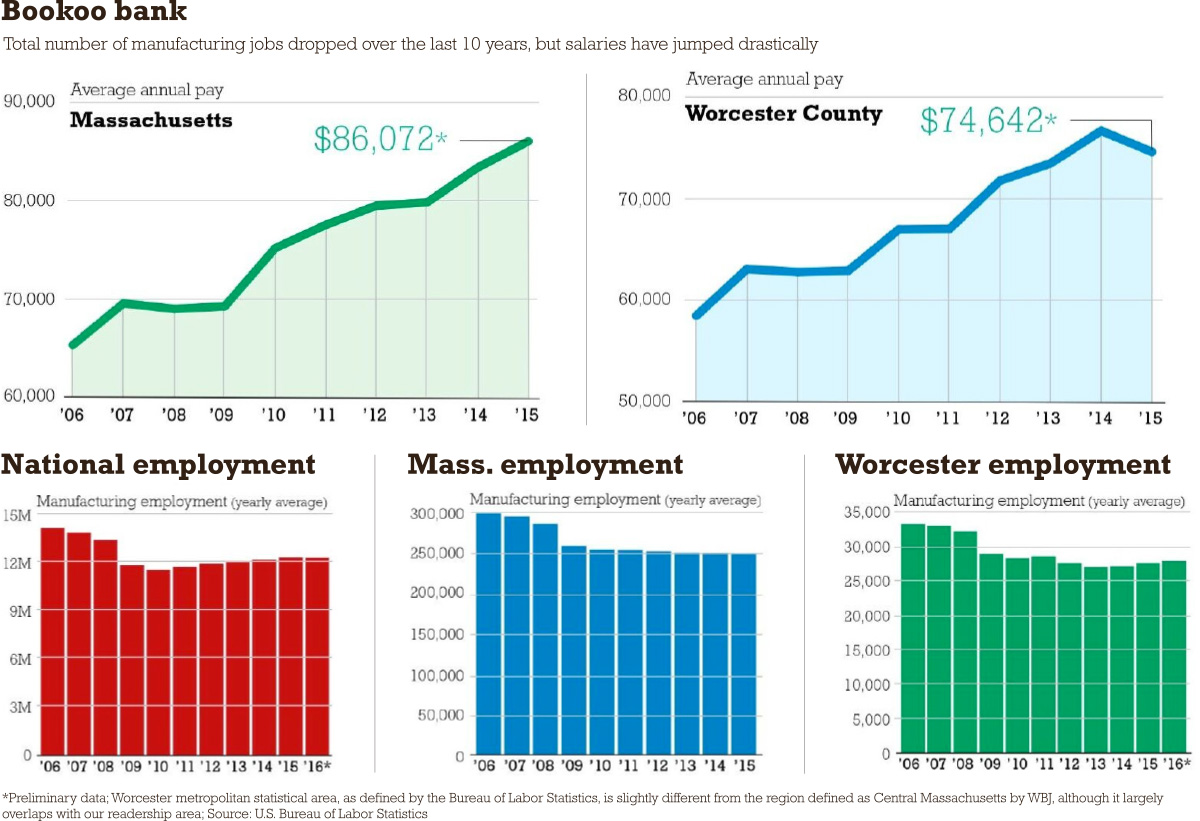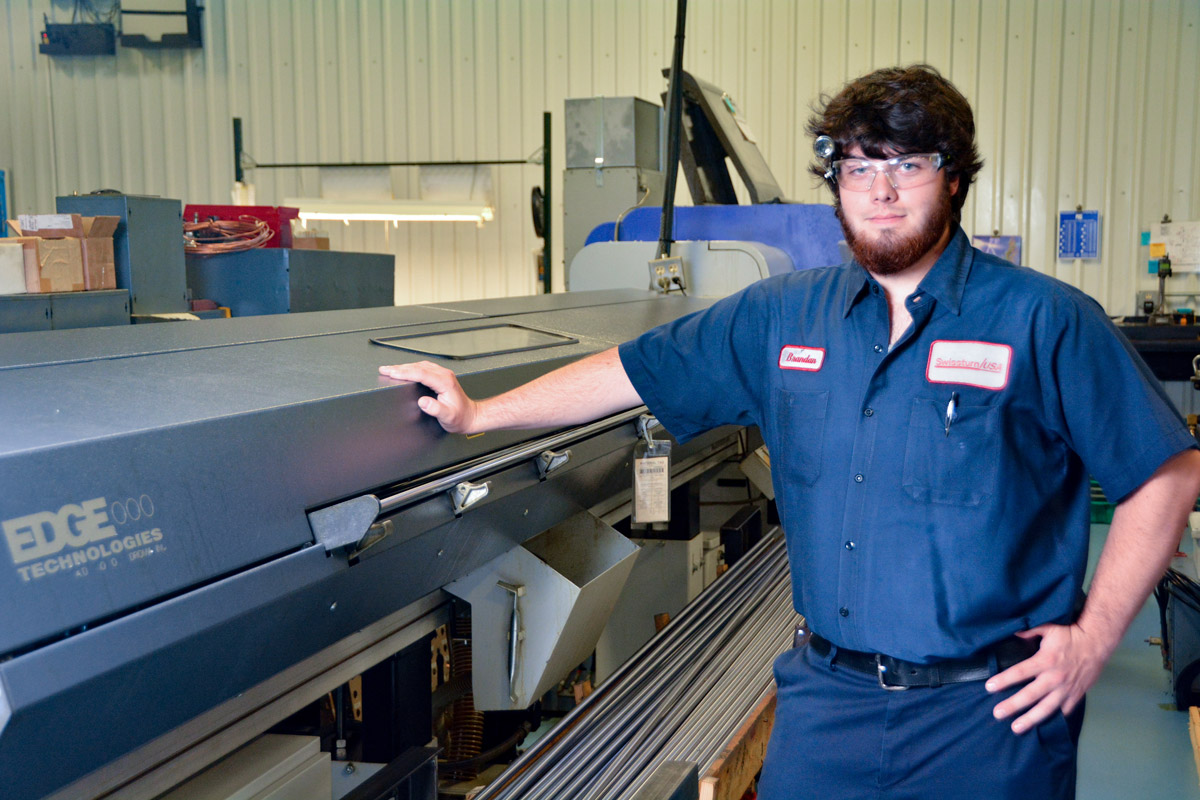
Millennials are making money, finding success and breaking the mold at Central Mass. manufacturers
Back when he was a student at Bay Path Regional Vocational Technical High School in Carlton, Brandan Myhaver didn’t see manufacturing as a great career.
“I got the image of working on a lathe for pennies an hour,” he said.
So Myhaver went into drafting, learning design programs and eventually landing a job making architectural drawings. But, after a few years of twists and turns at companies that were going through hard times, he found himself laid off, with a young child at home and another on the way.
That’s when he signed up for an eight-week course offered by the Massachusetts Manufacturing Extension Partnership (MassMEP). Before the program was done, he had a job at Swissturn in Oxford. He hasn’t looked back ever since.
Brandan Myhaver, 24
CNC machine setup operator at SwissTurn
Work location: Oxford
Home: Webster
Education: Bay Path Regional Vocational Technical School drafting program, some college courses in mechanical engineering
First manufacturing salary: About $30,000 per year
Current salary: Close to $45,000 per year
Job duties: Inspecting and troubleshooting machines, setting up and adjusting programs
Career aspirations: Landing a consulting position working with manufacturers to improve efficiency
Work-life balance: Brandan recently switched to a second-shift position and enjoys spending mornings with his young children.
A creative industry
When we hear about manufacturing, it’s often about the struggles workers face as jobs are automated or go overseas. But, for people willing to stay on top of modern technology and do work that often demands both physical and mental skills, the industry offers career paths with good pay and a chance to take part in some of the big technological innovations happening around us.
For Myhaver, working as a CNC machine setup operator at Swissturn means not just keeping productions machines running but adjusting the computer programs that tell them what to do, and even buying new tools that he sees are needed for the work.
“One of my favorite parts about this job is the freedom to, in a sense, be creative in an industry that many people don’t think has any creativity at all,” he said.
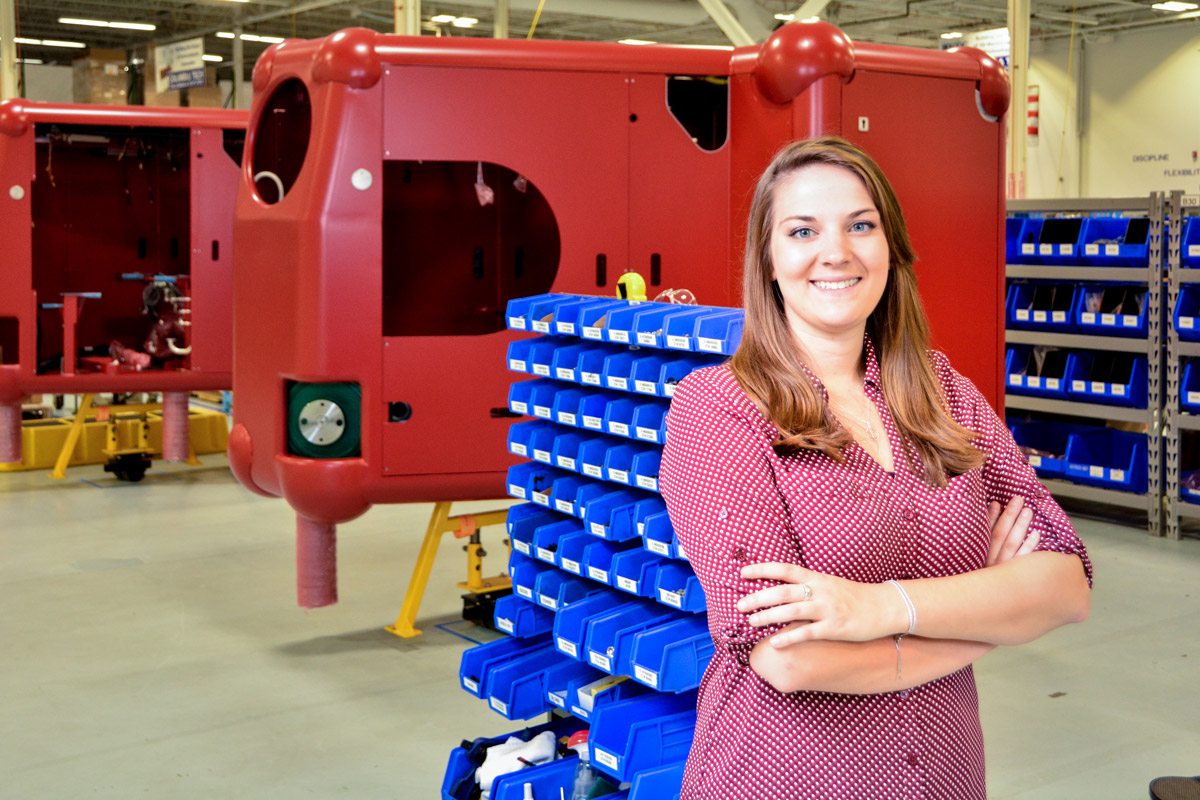
Forefront of technology
Like Myhaver, Sarah Fisher didn’t expect to end up in manufacturing. While working toward a master’s degree in business administration at Clark University in Worcester, she got an internship at a web marketing company and ended up working closely with one of its clients, Westborough contract manufacturer Coghlin Companies Inc.
“I really liked their whole family feeling,” Fisher said. “They were really great to work with.”
So, after finishing grad school, Fisher took a job with the company, going on to get two promotions in three years. She’s now Coghlin’s manager of marketing and communications, a job that gives her a backstage view of the technological breakthroughs that the company and its clients are working on.
Sarah Fisher, 26
Manager of marketing and communications at the Coghlin Companies
Work location: Westborough
Home: West Boylston
Education: Clark University, bachelor’s degree in management and MBA
Salary: Did not disclose (Marketing managers generally earn between $66,000 and $187,000, according to the U.S. Bureau of Labor Statistics)
Job duties: Runs web marketing, internal communication, work with third-party marketing firms, internal programs for company associates
Supernatural powers: Sarah loves the “secret view into the future” that she gets from seeing the new projects the company is working on.
“Really, the awesome thing about manufacturing is we’re building things in our facilities that people in the general population don’t believe can even exist yet,” she said. “You get this secret view into the future of what’s happening in all these industries.”
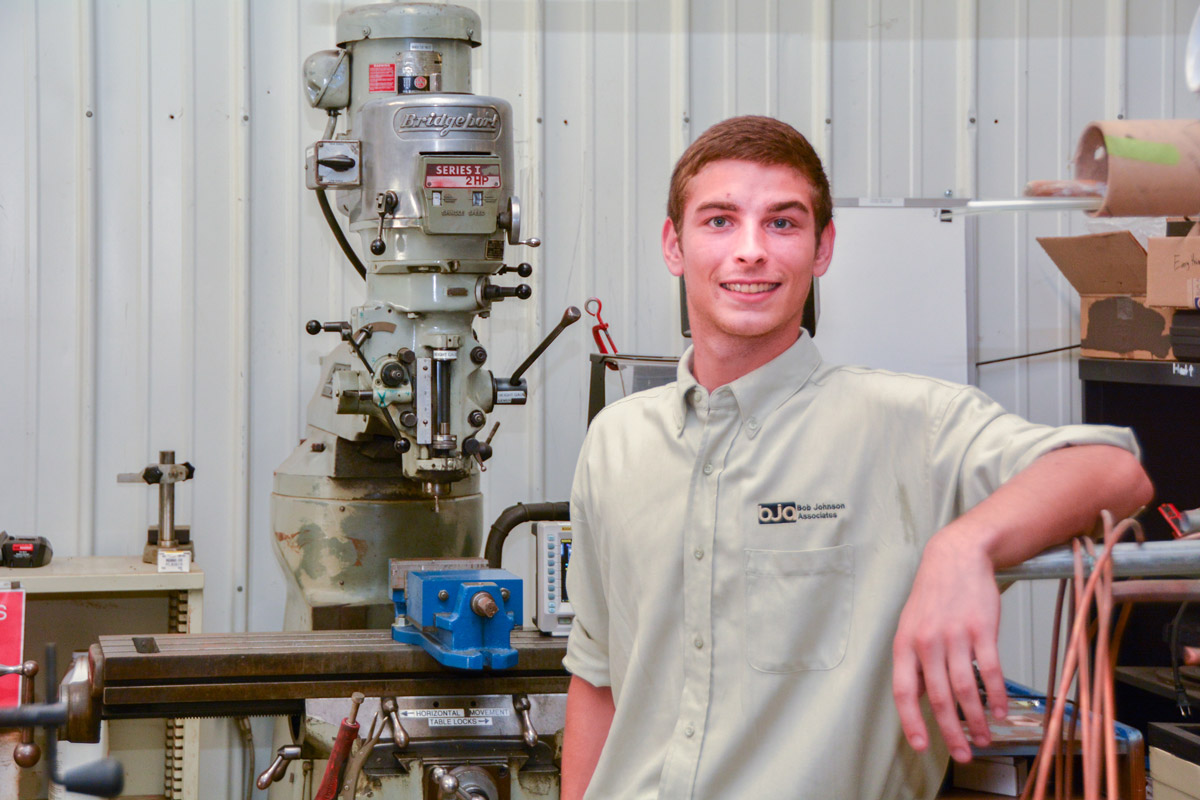
Full-time work, full-time pay
For Zach Roy, moving into manufacturing was a welcome change from the mishmash of retail, temp and farmhand jobs he’d held after dropping out of high school.
While taking a GED course through the organization My Turn in Fitchburg, Roy learned about a program at Mount Wachusett Community College designed to bring new workers into the industry. After two months of training, he got an internship with BJA Magnetics in Leominster that quickly turned into full-time work.
Roy said he likes the fact that every day at the small production company is different, and he enjoys the fast pace.
Zack Roy, 23
Production worker at BJA Magnetics
Work location: Leominster
Home: Fitchburg
Education: My Turn GED program in Fitchburg and two industry training programs at Mount Wachusett Community College
Wage: $12 per hour
Job duties: Varies, including inspecting products and preparing shipments
Career aspirations: “I’ll see where it carries me. I’m still young and I have plenty of life ahead of me.”
Job fun: Zach enjoys the fast pace of working on a factory floor.
“You have to keep a keen eye out for defects and little details,” he said.
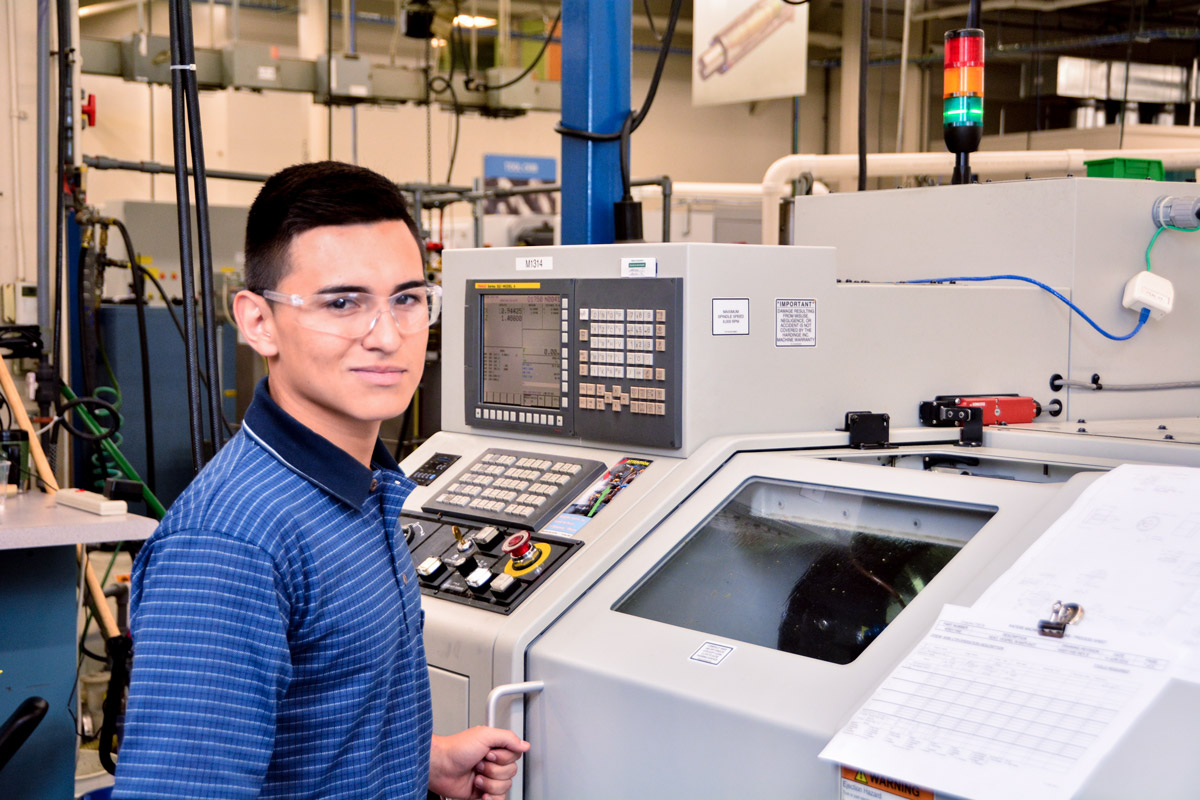
Getting an early start
While some people end up in manufacturing through round-about routes, David Cabrera knew it was what he wanted to do from a young age. In his junior year at Assabet Valley Regional Technical High School, he started working for Milford laboratory equipment maker Waters Corp. By the time he turned 19 this September, he’d been there for two years.
Cabrera said he’s always planned to move into engineering, but he wanted to start by getting hands-on with production. Now, Waters is helping him continue his education. He plans to take courses at Quinsigamond Community College and then continue into an engineering program at the Worcester Polytechnic Institute. Eventually, he said, he’d like to start his own business.
“I kind of like coming up with my own take on things,” he said.
David Cabrera, 19
CNC machine operator, Waters Corp.
Work location: Milford
Home: Marlborough
Education: Assabet Valley Regional Technical High School, advanced manufacturing program
Salary: Did not disclose (Machinists generally make between $25,000 and $61,000 per year, according to the U.S. Bureau of Labor Statistics.)
Job duties: Set up machines for new jobs, inspect and run machine, inspect output
Career aspirations: To become an engineer and start his own business
Off time: David appreciates the fact the he works a 40-hour week in just three days, leaving him four days every week to pursue other interests.
At Waters, Cabrera packs a full 40-hour work week into three long days. In the other four days, he helps out with the soccer program at his old high school, works some overtime hours or just enjoys the extra-long weekends.
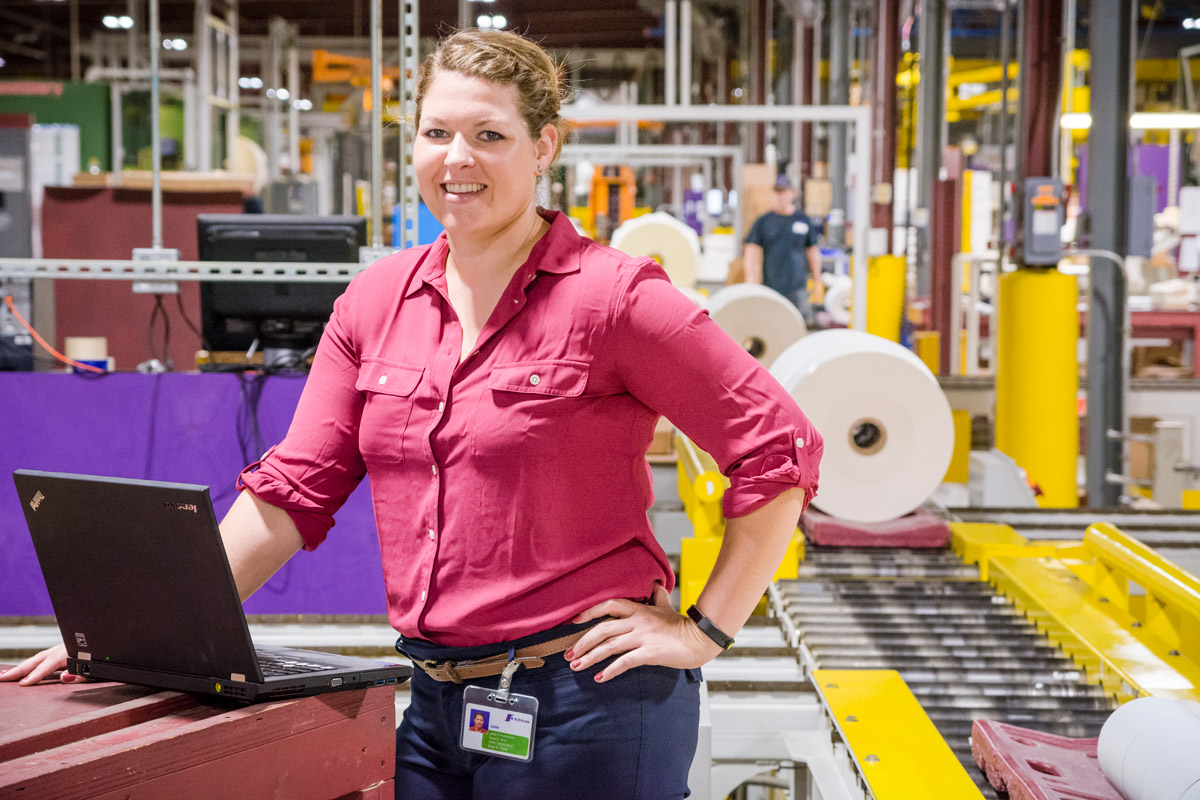
Fluid dynamics & heat transfer
Like Cabrera, Julie Fehlman decided early on that she wanted to be an engineer.
“I loved math and science, and engineering was actually a field you could go into where you could use those skills and create things,” she said.
At Union College in New York, she enjoyed learning about fluid mechanics and heat transfer. Now, she puts that knowledge to use at FLEXcon in Spencer.
Fehlman said manufacturing is a tough business, with lots of competition from overseas.
“But that’s exactly why we need people to be in manufacturing, because we need these jobs to be in the U.S.,” she said.
Fehlman said she sees her job as helping FLEXcon to operate efficiently and improve constantly so that it can keep being the important institution in the local area.◾
Julie Fehlman, 26
Project Engineer at FLEXcon
Work location: Spencer
Home: Worcester
Education: Bachelor’s degree in science and mechanical engineering from Union College in New York
Salary: Not disclosed (Industrial engineers generally earn between $53,000 and $127,000, according to the U.S. Bureau of Labor Statistics.)
Job duties: Determining equipment needs, purchasing and overseeing installation, focusing on industrial ventilation
Fascination: Julie enjoys working with fluid mechanics and heat transfer, subjects that fascinated her in college. She also wants to help FLEXcon remain an efficient, competitive company so that it can continue to be an important institution in the local area.
